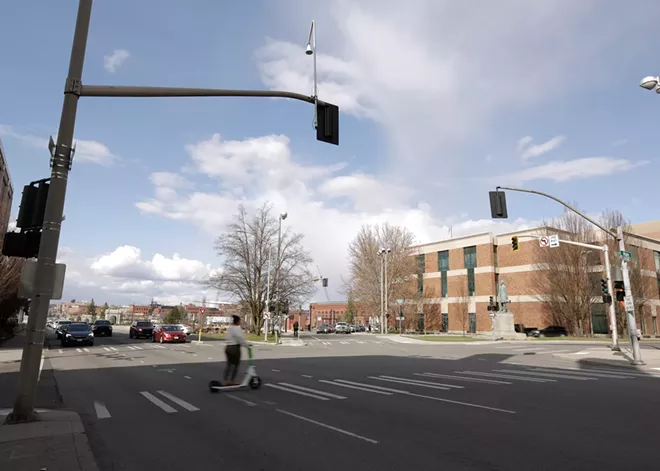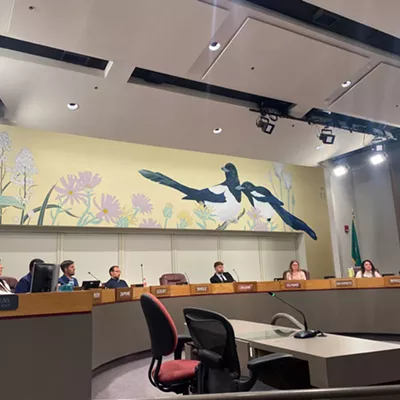Summer weather is starting to hit Spokane, and across the city, packs of bright green electric scooters and bikes are popping up on sidewalks like flowers sprouting from the ground.
Lime's roughly 1,500 rental electric scooters and bikes normally hit the streets of Spokane in March. But the local fleet's rollout was delayed until the first week of June this year as city officials solicited applications from other vendors and negotiated a stricter contract to address issues that have plagued Lime's tenure in Spokane.
Since Lime scooters and bikes first appeared in Spokane in fall 2018, more than 500,000 people have taken 2.3 million rides. Lime estimates that Spokane Lime rides have eliminated 570,000 car trips, saving an estimated 25,000 gallons of gas.
It's a "valuable option for folks to get around," says Hayden Harvey, director of government relations for Lime.
But Lime's reception in Spokane hasn't all been positive. Riders frequently park the scooters they've borrowed improperly — blocking sidewalks and causing accessibility problems. City law prohibits riding the scooters on sidewalks downtown, but people still do so frequently, which also causes conflicts with pedestrians.
There's also the river problem. It's not uncommon for vandals to toss the scooters — which have toxic lithium batteries — into the Spokane River. Last summer, the Spokesman-Review reported that a single magnet-fishing club had pulled 257 scooters from the river since 2019.
The start of Lime's sixth Spokane summer was also clouded by a high-profile vandalism incident as soon as the first scooters were put out last week.
The city's new contract seeks to hold Lime accountable by making it the company's responsibility to stop people from riding on sidewalks and improperly parking the light vehicles there. It also requires that Lime periodically report collisions involving its vehicles, pay to remove them from the river and distribute at least 10% of its fleet in underserved parts of the city.
If Lime fails to follow the new rules, the city can fine the company between $500 and $2,500 per day; each day an issue goes unaddressed may count as a separate offense.
"There are additional requirements that will hold them accountable," Ryan Shea, a city planner, told City Council members last month.
The City Council voted 5-2 last week to approve the new two-year contract (with an option to renew), though some council members expressed lingering concerns.
"I don't think the revenue justifies the inconvenience," Council member Kitty Klitzke said. "I think we should really see this as a pilot project, and if it doesn't work, reserve our right to pull out of the contract."
Lime pays the city an annual fee of $17,000, in addition to 75 cents per vehicle per day. The agreement netted the city $190,000 in 2022 and $186,000 last year, with the funds going to transportation projects.
Council members Lili Navarette and Michael Cathcart voted against the new contract.
"I personally never really liked the Lime scooters," Navarette said, citing issues with the scooters blocking sidewalks and being thrown in rivers. "They're a nuisance."
WRONG PLACE, RIGHT LIME
Lime has a monopoly in Spokane because the city only allows one rental bike/scooter company to operate at a time. That's not the case in all cities. Seattle, for instance, has five rental companies: Bird, Link, Lime, Spin and Wheels.Council members Cathcart and Jonathan Bingle have argued that the city should open things up and drive competition by allowing multiple companies to operate at the same time. But Shea, with the city, told council members last month that multiple operators would burden city staff. The North American Bikeshare and Scootershare Association recommends limiting things to one or two operators for cities with populations between 200,000 and 500,000, he added.
Klitzke also expressed concern about multiple operators exacerbating issues with the electric vehicles crowding sidewalks.
When finished riding a Lime scooter or bike, users are required to park them "out of public pathways and upright with the kickstand down." But that often doesn't happen.
Improperly parked Lime scooters and bikes that block sidewalks can be an especially big issue for people in wheelchairs, the elderly, families with strollers and people with vision impairment.
Greg Szabo, who works for a Spokane not-for-profit called Lighthouse for the Blind, told the council members last Monday that he is vision impaired and has been blocked by many improperly parked Lime vehicles.
"There's nothing I can do except turn around," Szabo said.
To address the problem, the new contract requires Lime to implement a fine system. Users who park the bikes or scooters improperly will receive a $10 fine, which doubles with each subsequent violation. After five violations, they'll be banned from the app.
The new contract also requires Lime to remove scooters that are thrown in the river within 24 hours. If they fail to do so, the city will hire a contractor to do it and invoice Lime for the costs.
Encountering someone riding a Lime on the sidewalk can be a "visible and often frustrating experience," Harvey says. To address that, the new city contract requires Lime to phase in a new camera technology that uses artificial intelligence to detect when people are riding on sidewalks.
Harvey notes that sidewalk riding is also a problem of infrastructure.
"People ride on sidewalks when they fear for their lives in the streets," Harvey says. "With better infrastructure, we see less sidewalk riding."
'VILE ACT'
Last week, as the first Lime scooters of the year rolled onto Spokane streets, the company was confronted with a new problem: anti-LGBTQ+ vandalism.On Wednesday night, June 5, police arrested three young people who allegedly yelled a homophobic slur at a witness and used Lime scooters to create skid marks on the Riverfront Pride mural. The mural had just been repainted hours earlier to cover damage from a group who set it on fire a few weeks prior.
Harvey says the recent incident was a "vile act."
"For our devices to be used to deface this community art is upsetting to say the least," Harvey says.
Lime responded to the incident by creating a "no ride" zone around the mural to prevent it from future vandalism. The company is also donating $2,000 to Spokane Arts to help repaint the mural, again.
When asked about community members' continued concerns about Lime — the sidewalk riding, the parking problems, the river contamination and the general sense of destruction that sometimes follows the scooters — Harvey says Lime is dedicated to working with Spokane.
"At every juncture, we have moved with haste to solve issues," Harvey says. "We are ultimately committed to the city of Spokane and Spokanites who use and rely on Lime and those who don't." ♦


























